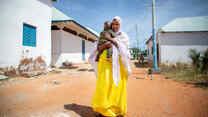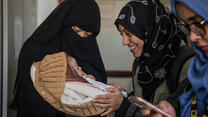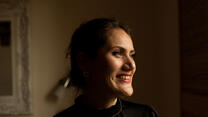Somalia is facing a severe drought. More than two million people could die of starvation by September.
The most vulnerable: children.
A new series of portraits by the International Rescue Committee highlights the challenges faced by mothers who are suffering from a cycle of violence, drought and famine. They spoke about their courage and determination to help give their families a chance for a better future.

Hamdi Sheikh Mukhtar, 40, fled from a rural town in Buur-Heled which is experiencing a “catastrophic” drought. “We faced famine for three years,” she says. “We had no wells, all the rivers dried.”
Hamdi and her family now live in a camp for people displaced by violence as well as drought and famine. Her husband collects sticks to sell and Hamdi washes clothes. They make just enough to pay for two meals a day.
Hamadi’s great hope: that her children, like 10-month-year-old Sheikh, will grow up not having to live with hardship.

Distressed. Sleepless nights. No appetite.
This is how Deko Rable Rage, 25, felt when her youngest son, Abdiladif, fell ill. He was diagnosed with malnutrition. Deko had already lost one son; she feared she might lose another.
“I made his health my priority,” she says. She took her son to an IRC-run clinic, where he received lifesaving treatment.
Deko was first displaced in 2009 after she fled from fighting between the Somali government and armed groups. Her husband is unable to work, so Deko supports her family through her small henna business.
She does her best to be a good mother. “I have unconditional love for my kids,” she says. She can’t afford toys, but she always makes time to play with them.
Deko’s dream is for her children to get an education and become doctors, so they too can treat sick children.

Najmo Omar Hassan’s youngest child, Zuhur, was born a month late and had to be kept in an incubator for 33 days. The 10-month-year-old suffered from medical complications and remained underweight. She first received treatment at an IRC-run nutrition clinic and then moved to a local stabilization center for one week. She continues to receive care at the IRC clinic.
“She has made huge progress,” Najmo says. “When I first brought her [at the IRC-run clinic], you could easily count her ribs.” Now Zuhur weighs 8 lbs. and is growing.

Isho Sidow Mohamed, 32, has lost one child to hunger. “A war was going on,” she says. “We had nothing to eat or drink. Those were the worst days of my life.”
The family usually eats one meal per day—two if they are lucky. Isho is unable to afford an education for her children, but she hopes all that will change.
“I always motivate myself,” she says. “I may not have much to give, but I give my children the love they need."

Meymun Mohamed Osman was just 14 when she fled her hometown to escape violence. Now 18 and a mother of two, she is determined to give her children a better life. But feeding them has been hard—they are surviving on maize—and she worries about sending them to school. Where Meymun lives, kidnappings are common.
“I want to give them everything,” says Meymun. “I want them to be playful and joyful…. The biggest fear we have now is that when we send the children to school, they will be kidnapped. Recently, my neighbors child was kidnapped [from school].”

Taliso Ahmed Mohamud is a single mom hoping to find work to help provide for her children.
“We might eat one or two meals a day depending on the situation, she says. “We normally eat canjero (pancake) in the morning, and whatever food we can get in the evening we eat. If not, we sleep on an empty stomach.”
Times are hard and life can be a struggle—But Taliso, too, has high hopes for her children.
“I want them to be well educated—I did not get the opportunity to learn. I give them whatever I can afford. They are my strength.”
Photos by Kellie Ryan/IRC
How the IRC helps
By the end of 2019, almost one million children are anticipated to be malnourished in Somalia. The IRC is ramping up efforts in the main areas of concern, Puntland and central Somalia, and is significantly scaling up our programming to support families with healthcare for malnourished children, unconditional cash transfers to help people quickly get the support they need, rehabilitation of boreholes and water sources as well as mobile health services to reach deeper into hard hit areas. Learn more about our work.



